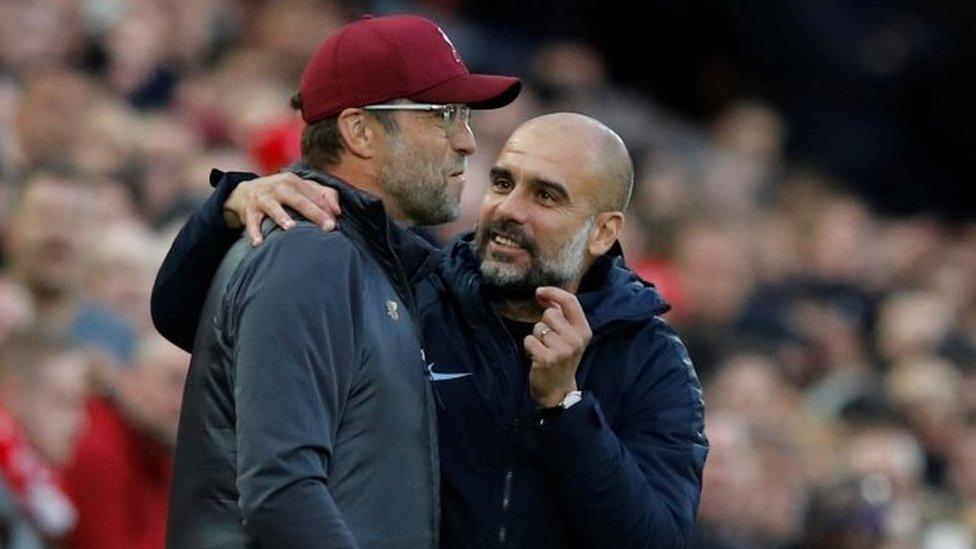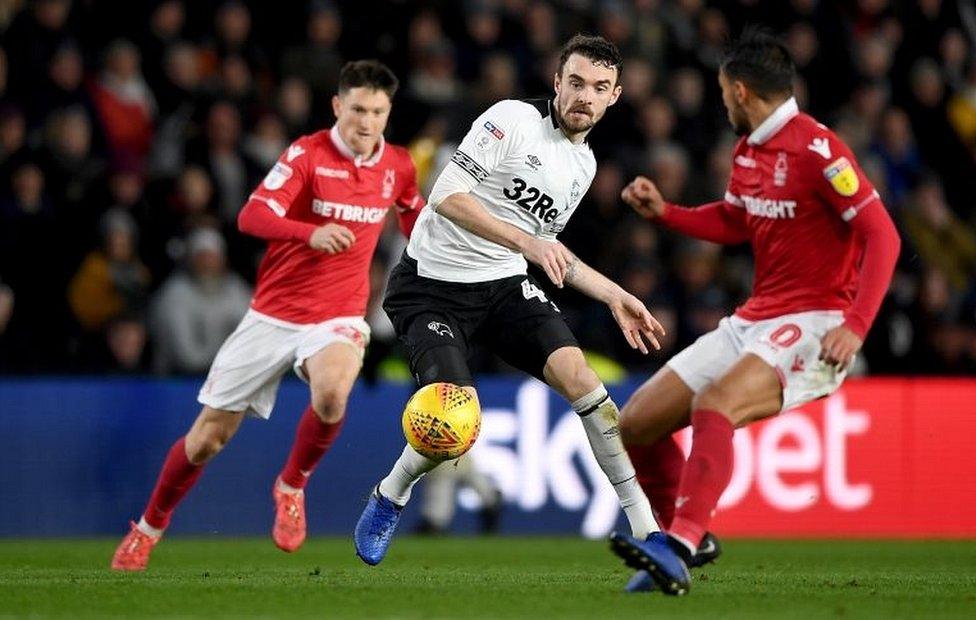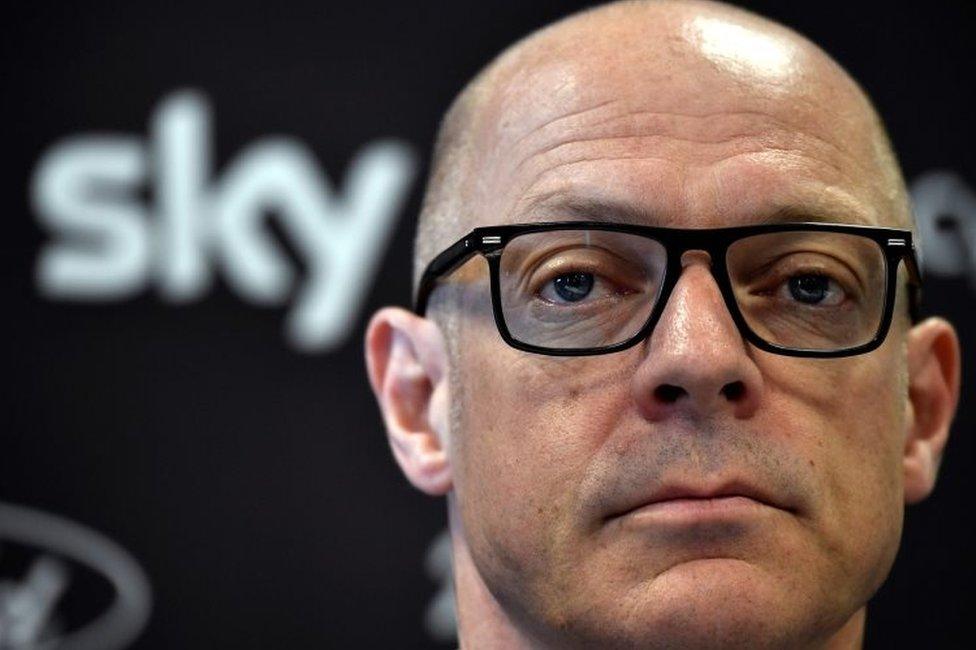The challenges facing Britain's new sporting leaders
- Published

2018. Sport's changing of the guard
Jose Mourinho may have been the victim of the highest-profile sacking of the sporting year, but the former Manchester United manager was far from alone when it came to changes of leadership.
Indeed, 2018 will be remembered for a changing of the guard among some of the most powerful and influential figures in British sport.
A period of transition where the balance of power shifted, and the established order was threatened.
And even for those who remain, this has been a time of both change and challenge.
In football management, the reputations of men such as Pep Guardiola, Jurgen Klopp, Mauricio Pochettino and Unai Emery, along with England's Gareth Southgate of course, were further enhanced.
Their success only reinforced the sense that amid growing player power, the game had moved on, leaving the likes of Mourinho behind, along with his former rival Arsene Wenger, who also parted the scene. The Frenchman was finally prised away from Arsenal in May after 22 years in control.


Also in the football world, FA chief executive Martin Glenn recently announced this would be his final season in charge.
There is much for him to be proud of, not least England's historic and unforgettable journey to the World Cup semi-finals this summer, and similar success during his tenure for the country's women's and youth teams - although former FA technical director Dan Ashworth - who also decided to leave the governing body - must take plenty of credit, too.
But Glenn's failure to convince the FA's council to approve the controversial sale of Wembley stadium to American billionaire Shahid Khan was a major blow and may have persuaded him to quit.
The subsequent loss of a windfall worth hundreds of millions of pounds for the country's cash-strapped grassroots facilities shone a new light on the stark contrast in resources between the top and bottom of the sport.
By then, Premier League supremo Richard Scudamore, who helped England's top clubs generate extraordinary wealth during his 19 years in charge, had also announced his resignation.
But it was perhaps partly as a result of the renewed focus on inequalities in the sport that his £5m departure bonus from the clubs proved so controversial last month, with supporters' groups condemning the pay-off as another example of a culture of greed.

Does the TV deal with the Championship undervalue the clubs' allure?
Finances caused tension elsewhere, too. Some Championship clubs were furious with the Football League (EFL) for signing a £600m deal with Sky that they felt undervalued their TV rights, and would harm ticket sales by broadcasting too many games.
The nuclear option of a breakaway league seems to have been averted, with the EFL insisting its deal represents stability and good business.
But the rebel clubs - who seem increasingly restless about the sustainability of their finances, and the vast gulf in broadcasting revenue between themselves and the Premier League - are exploring possible legal action, and the position of EFL boss Shaun Harvey appears vulnerable going into 2019.
Another long-serving administrator in the sport under unprecedented pressure over money was Professional Footballers' Association (PFA) chief executive Gordon Taylor.
With former players calling for him to step down after 37 years in charge, amid criticism of his £2.3m salary and the union's welfare work, he finally agreed to an independent review.

Tracey Crouch resigned after three years as sports minister
And with the PFA's chairman - current player Ben Purkiss - leading the revolt against Taylor, scrutiny of one of the longest reigns in British sport looks set to continue.
There were signs that the players had finally found their voices elsewhere, too.
Manchester City captain Vincent Kompany spoke out about homelessness, while his teammate - England star Raheem Sterling - attacked the media for fuelling a spate of racist abuse at matches through negative coverage of black players, prompting renewed debate across the game.
Lord Ouseley, the founder and chairman of English football's anti-discrimination campaign group Kick It Out for the last quarter of a century, announced his retirement days later, appealing for the sport's leaders to finally unite and bring about change.
Away from football, BBC Sport revealed a secret compromise deal the World Anti-Doping Agency (Wada) has struck with Russia to end its suspension for a state-sponsored cheating scandal, sparking an unprecedented outcry from Western athletes.
The claims of Canadian ex-Olympian Beckie Scott - the chair of Wada's athletes' commission - that she had been bullied by senior officials over her opposition to the Russian compromise - heaped further pressure on the global watchdog's British president Sir Craig Reedie.
He - like Taylor and Harvey - defied calls to resign, but will stand down next year after six years in charge when his term ends. The choice of replacement will set the future direction of the anti-doping movement for years to come.
UK Sport chief executive Liz Nicholl also announced she would leave her role in 2019.
As the head of an organisation that has invested billions into high performance, she has arguably been the most powerful person in British sport for almost a decade, her tenure coinciding with the country's emergence as an Olympic and Paralympic superpower.

Sir Dave Brailsford is looking for a new backer
But amid a series of athlete welfare and governance scandals at various national governing bodies, along with growing concern over the way funding was linked strictly to medal potential, Nicholl's leadership has also come under mounting scrutiny.
With the results of a strategic consultation due next month, many will now expect a more flexible approach by UK Sport going forward.
But regardless, the organisation may soon be forced to transform the way it funds athletes.
At a recent employment tribunal, former Team GB Olympic sprint cyclist Jess Varnish argued she should have had employee status. If this initial stage of her landmark legal action against British Cycling and UK Sport for discrimination is successful, athletes could become empowered, with greater rights.
UK Sport meanwhile may suddenly be liable for publicly funded athletes' pensions and National Insurance contributions. Much is at stake when the tribunal rules early in the new year.
Meanwhile, the growing sense of a new era of athlete power was only reinforced when Adam Peaty - Britain's number one swimming star - dared world governing body Fina to ban him after he backed plans for a new International Swimming League.
There have been further changes among sport's movers and shakers. At Sport England, the body responsible for participation, chief executive Jennie Price left after 11 years to be replaced by former British Paralympic Association chief Tim Hollingsworth.
In Whitehall, Tracey Crouch resigned after three years as sports minister having become impatient with delays to gambling regulations.
And at Twickenham, RFU chief executive Steve Brown also stepped down amid financial difficulties at the organisation.
Team Sky may be Britain's most successful - and controversial - professional sports team, but its world-beating cyclists faces an uncertain future after its commercial partner, satellite broadcaster Sky, announced it was pulling out this year after a decade of support.
Team boss Sir Dave Brailsford now has just a few months to find a new backer, or the dominant force in cycling - having won six of the last seven editions of the Tour de France - will fold. That would sadden the team's fans and please their critics after a series of scandals.
But as 2018 has proved, nothing in sport lasts for ever.